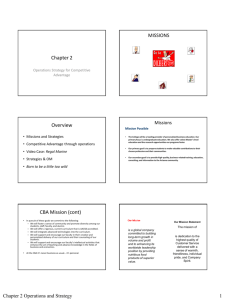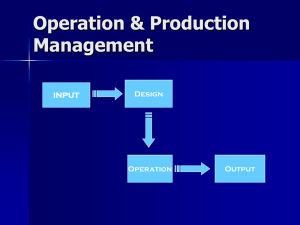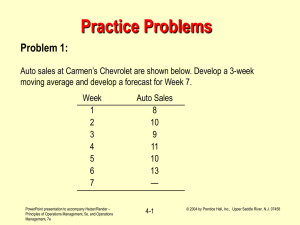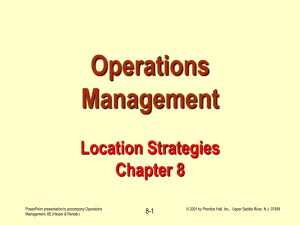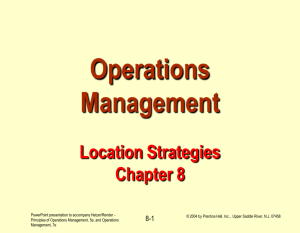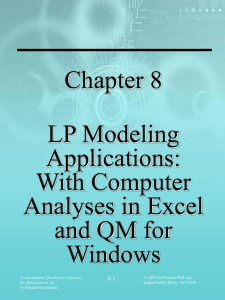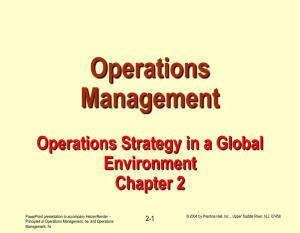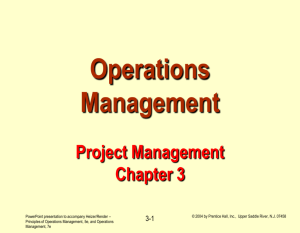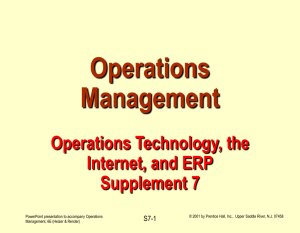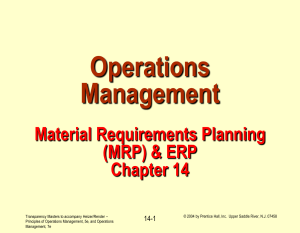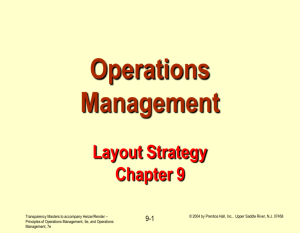Chapter 1, Heizer/Render, 5th edition
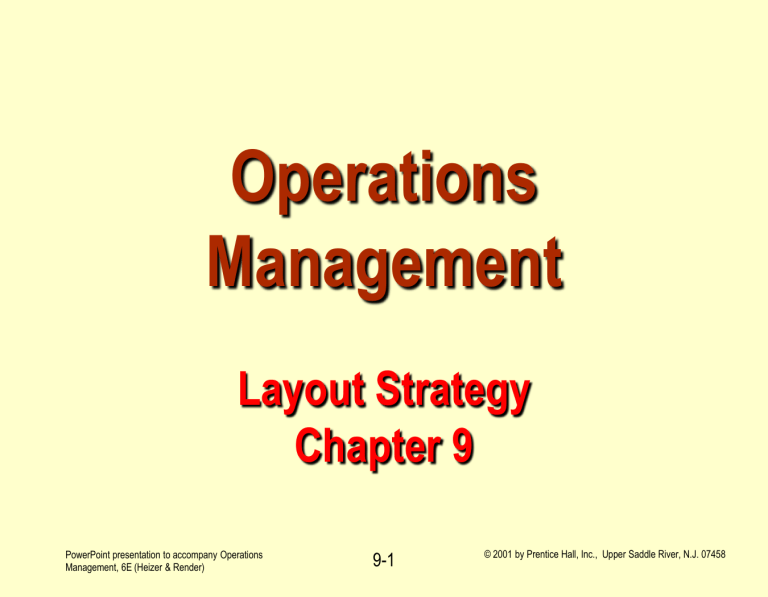
Operations
Management
Layout Strategy
Chapter 9
PowerPoint presentation to accompany Operations
Management, 6E (Heizer & Render)
© 2001 by Prentice Hall, Inc., Upper Saddle River, N.J. 07458 9-1
McDonald’s - New Kitchen Layout
Fifth major innovation - kitchen design
No food prepared ahead except patty
Elimination of some steps, shortening of others
New bun toasting machine (11 seconds vs 30 seconds)
Repositioning condiment containers (one motion, not two)
Sandwiches assembled in order
Production levels controlled by computer
Discard only meat when sandwiches do not sell fast enough
Savings of $100,000,000 per year in food costs
PowerPoint presentation to accompany Operations
Management, 6E (Heizer & Render)
9-2 © 2001 by Prentice Hall, Inc., Upper Saddle River, N.J. 07458
Types of Layouts
Fixed-position layout
Process-oriented layout
Office layout
Retail layout
Warehouse layout
Product-oriented layout
PowerPoint presentation to accompany Operations
Management, 6E (Heizer & Render)
9-3 © 2001 by Prentice Hall, Inc., Upper Saddle River, N.J. 07458
Six Layout Strategies
Fixed-position layout
large bulky projects such as ships and buildings
Process-oriented layout
deals with low-volume, high-variety production (“job shop”, intermittent production)
Office layout
positions workers, their equipment, and spaces/offices to provide for movement of information
PowerPoint presentation to accompany Operations
Management, 6E (Heizer & Render)
9-4 © 2001 by Prentice Hall, Inc., Upper Saddle River, N.J. 07458
Six Layout Strategies - continued
Retail/service layout
allocates shelf space and responds to customer behavior
Warehouse layout
addresses trade-offs between space and material handling
Product-oriented layout
seeks the best personnel and machine use in repetitive or continuous production
PowerPoint presentation to accompany Operations
Management, 6E (Heizer & Render)
9-5 © 2001 by Prentice Hall, Inc., Upper Saddle River, N.J. 07458
Requirements of a Good Layout
an understanding of capacity and space requirements selection of appropriate material handling equipment decisions regarding environment and aesthetics identification and understanding of the requirements for information flow identification of the cost of moving between the various work areas
PowerPoint presentation to accompany Operations
Management, 6E (Heizer & Render)
9-6 © 2001 by Prentice Hall, Inc., Upper Saddle River, N.J. 07458
Fixed-Position Layout
Design is for stationary project
Workers and equipment come to site
Complicating factors
Limited space at site
Changing material needs
PowerPoint presentation to accompany Operations
Management, 6E (Heizer & Render)
9-7 © 2001 by Prentice Hall, Inc., Upper Saddle River, N.J. 07458
Process-Oriented Layout
Design places departments with large flows of material or people together
Department areas having similar processes located in close proximity
e.g., All x-ray machines in same area
Used with process-focused processes
PowerPoint presentation to accompany Operations
Management, 6E (Heizer & Render)
9-8 © 2001 by Prentice Hall, Inc., Upper Saddle River, N.J. 07458
Office Layout
Design positions people, equipment, & offices for maximum information flow
Arranged by process or product
Example: Payroll dept. is by process
Relationship chart used
Examples
Insurance company
Software company
PowerPoint presentation to accompany Operations
Management, 6E (Heizer & Render)
© 2001 by Prentice Hall, Inc., Upper Saddle River, N.J. 07458
Corel Corp.
Retail/Service Layout
Design maximizes product exposure to customers
Decision variables
Store flow pattern
Allocation of (shelf) space to products
Types
Video
Grid design
Free-flow design
PowerPoint presentation to accompany Operations
Management, 6E (Heizer & Render)
9-10 © 2001 by Prentice Hall, Inc., Upper Saddle River, N.J. 07458
Retail Layouts -
Some Rules of Thumb
Locate high-draw items around the periphery of the store
Use prominent locations such as the first or last aisle for high-impulse and high margin items
Remove crossover aisles that allow customers the opportunity to move between aisles
Distribute what are known in the trade as “power items”
(items that may dominate a shopping trip) to both sides of an aisle, and disperse them to increase the viewing of other items
Use end aisle locations because they have a very high exposure rate
PowerPoint presentation to accompany Operations
Management, 6E (Heizer & Render)
9-11 © 2001 by Prentice Hall, Inc., Upper Saddle River, N.J. 07458
A Good Service Layout
(Servicescape) Considers
Ambient conditions - background characteristics such as lighting, sound, smell, and temperature.
Spatial layout and functionality - which involve customer circulation path planning
Signs, Symbols, and Artifacts characteristics of building design that carry social significance
PowerPoint presentation to accompany Operations
Management, 6E (Heizer & Render)
9-12 © 2001 by Prentice Hall, Inc., Upper Saddle River, N.J. 07458
Warehouse Layout
Design balances space (cube) utilization
& handling cost
Similar to process layout
Items moved between dock
& various storage areas
Optimum layout depends on
Variety of items stored
Number of items picked
PowerPoint presentation to accompany Operations
Management, 6E (Heizer & Render)
9-13 © 2001 by Prentice Hall, Inc., Upper Saddle River, N.J. 07458
Product-Oriented Layout
Facility organized around product
Design minimizes line imbalance
Delay between work stations
Types: Fabrication line; assembly line
PowerPoint presentation to accompany Operations
Management, 6E (Heizer & Render)
9-14 © 2001 by Prentice Hall, Inc., Upper Saddle River, N.J. 07458
Product-Oriented Layout Advantages
Lower variable cost per unit
Lower material handling costs
Lower work-in-process inventories
Easier training & supervision
PowerPoint presentation to accompany Operations
Management, 6E (Heizer & Render)
9-15 © 2001 by Prentice Hall, Inc., Upper Saddle River, N.J. 07458
Product-Oriented Layout
Disadvantages
Higher capital investment
Special equipment
Any work stoppage stops whole process
Lack of flexibility
Volume
Product
PowerPoint presentation to accompany Operations
Management, 6E (Heizer & Render)
9-16 © 2001 by Prentice Hall, Inc., Upper Saddle River, N.J. 07458
An Assembly Line Layout
PowerPoint presentation to accompany Operations
Management, 6E (Heizer & Render)
9-17 © 2001 by Prentice Hall, Inc., Upper Saddle River, N.J. 07458
Repetitive Layout
Work 1
Work Station
Station 3
2
Belt Conveyor
4
Work
Station
5
Office
Note: 5 tasks or operations; 3 work stations
PowerPoint presentation to accompany Operations
Management, 6E (Heizer & Render)
9-18 © 2001 by Prentice Hall, Inc., Upper Saddle River, N.J. 07458
Layout Heuristics for Assigning
Tasks in Assembly Line Balancing
Longest task time - choose task with longest operation time
Most following tasks - choose task with largest number of following tasks
Ranked positional weight - choose task where the sum of the times for each following task is longest
Shortest task time - choose task with shortest operation time
Least number of following tasks - choose task with fewest subsequent tasks
PowerPoint presentation to accompany Operations
Management, 6E (Heizer & Render)
9-19 © 2001 by Prentice Hall, Inc., Upper Saddle River, N.J. 07458
